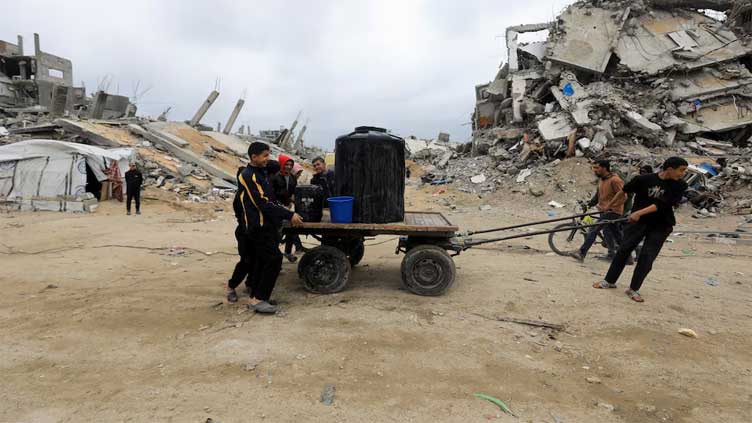Hamas accuses Israel of ceasefire breaches before next hostage-for-prisoner swap

World
Hamas accuses Israel of ceasefire breaches before next hostage-for-prisoner swap
CAIRO/JERUSALEM (Reuters) - Hamas accused Israel on Friday of breaching their ceasefire accord and it delayed announcing the names of three more Israeli hostages due to be exchanged for Palestinian prisoners in the latest stage in a fragile deal aimed at ending the war in Gaza.
The militant group had been scheduled to announce the names of three hostages to be freed on Saturday but as a 4 pm (1400 GMT) deadline passed, there was no sign of the names. It was not immediately clear whether the delay would affect the scheduled exchange on Saturday.
Hamas accused Israel of delaying the entry of hundreds of trucks carrying food and other humanitarian supplies agreed under the truce deal that took effect on January 19, and holding back all but a fraction of the tents and mobile homes needed to provide shelter to people returning to their bombed-out homes.
"This demonstrates clear manipulation of relief and shelter priorities," Hamas said in a statement.
COGAT, the Israeli military agency that is overseeing the aid deliveries into Gaza, denied the accusation and warned that Israel would "not tolerate violations by Hamas".
The spat compounds the uncertainty around the ceasefire that had already mounted following US President Donald Trump's surprise announcement this week that he expected Gaza to be taken over by the United States.
Trump said on Tuesday he wanted to move the population of Gaza to a third country like Egypt or Jordan and place the small coastal enclave under US control to be developed into the "Riviera of the Middle East".
The statement underlined the fragility of the deal reached last month with Egyptian and Qatari mediators and backed by the United States.
Israeli Prime Minister Benjamin Netanyahu endorsed Trump's vision for Gaza as a "remarkable" plan, but it was immediately rejected by Arab countries, Palestinian groups including Hamas and the Palestinian Authority, and many Gazans, who said they would rebuild their homes and restaurants themselves.
However Israeli leaders have repeated the line that Gazans who wish should be able to leave and Defence Minister Israel Katz ordered the army on Thursday to prepare a plan to allow for the departure of Gaza residents who wanted to go.
So far, 13 Israeli hostages of the 33 children, women and older men set to be released in the first, 42-day phase of the agreement have come home, and hundreds of Palestinian prisoners and detainees have been released in exchange. Five Thai hostages have also been returned.
Work on the second stage of the multi-phase agreement, aimed at securing the release of around 60 male hostages and the withdrawal of Israeli troops from Gaza, has begun and an Israeli negotiating team was expected to fly on Saturday to Doha, Israeli media reported on Friday.
However the accusations levelled by Hamas against Israel underscored how little trust there was between the two sides following more than 15 months of the bloodiest episode in the decades-long conflict.
The Israeli military said on Friday that commanders were conducting situational assessments ahead of the next phase of the agreement currently being discussed, with troops deployed at various points around the Gaza Strip.
'CLEAR MANIPULATION'
Hamas said only 8,500 trucks out of the 12,000 that should have arrived so far had entered the territory, most containing food and secondary goods including chips and chocolate instead of more urgent items.
In addition, only 10% of the 200,000 tents and 60,000 caravans needed to provide shelter had arrived, Hamas said, leaving hundreds of thousands in harsh winter weather.
Finally, heavy machinery needed to clear millions of tonnes of rubble and recover the thousands of bodies thought to be buried had not arrived.
Almost three weeks after the start of the ceasefire, "the catastrophic humanitarian situation in Gaza continues to deteriorate dangerously", the Hamas statement said.
Israel has rejected accusations that it is dragging its feet on enabling the entry to aid supplies as "a completely unfounded claim", saying it has allowed in thousands of trucks, including tents and shelters.
COGAT said more than 100,000 tents had entered Gaza since the agreement came into force last month and that caravans were also being allowed in, while tractors had entered from Egypt since Sunday. It said 12,600 trucks had entered Gaza so far.
But hundreds of thousands of people are still marooned in tents and other makeshift shelters worn out by months of use as the fighting raged last year.
So far, despite accusations of ceasefire breaches levelled by both sides, the truce has held, leaving the way still open to an end to the war and rebuilding densely populated Gaza, which now lies in ruins.


